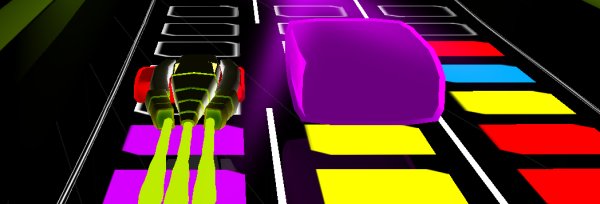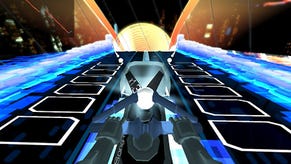New Wave: Dylan Fitterer on Audiosurf
Audiosurf, in terms of both commercial and critical success, is the indie-hit of the year so far. It managed to pick up an IGF award at the same time it was sitting at the top of the Steam charts for all of February. It's caused more listening to eighties-pop music than is strictly healthy at RPS towers, and we love it still. We grabbed an opportunity to speak to its creator, Dylan Fitterer. We talk about music, people's physical response to music and whether he's incredibly rich. But we start with the core of things; that is, how Audiosurf works anyway...
RPS: Jim describes Audiosurf as "Alchemy". As in, how it creates levels can seem more than just a program should do - it's something almost unearthly. How do you do it? Was it just a case of deciding general rules and then relying on their robustness to create something coherent, or... well, what? You tell us. Tell us a little about what's inside your magic box.
Dylan Fitterer: Alchemy, as opposed to chemistry, is exactly the right word. It was created through a fairly chaotic trial and error process. I'd often add a rule to create a cool moment in one song that ended up ruining the best part of another. Once I discovered the ruined song I'd fix it (and probably ruin another). Eventually it grew into the mess of code it is today that works well for most songs and sometimes really shines.
RPS: So there a time when you were playing early Audiosurf and just tweaking the results. As in, it should be steeper here, it should turn faster, etc. How did you make these sort of decisions? How did you know that this sort of slope felt "Right" for the exciting bit in Wolf Like Me or whatever?
Dylan: Wow - I don't really know. I'm not very good at deciding that something is "Right" and sticking with it. I second-guess constantly and always look for ways to improve. The first hints that there was really something to this whole idea was slowly climbing a hill and getting goosebumps as it rushed me over the top. Those moments have seen a lot of adjustments to try and reach the impossible "Right".
RPS: "Goosebumps": That's something I get with Audiosurf a lot. Do you have a very physical reaction to music? Is that the sort of thing which drove you towards making it?
Dylan: I think so, yeah. Listening to music is when I feel emotions strongest and emotions/physical reactions seem to be some kind of feedback loop. Music creates a mood and atmosphere that can change my mode. I like using that to my advantage and getting myself into a desired state through song choices.
RPS: Okay: an obvious one - what songs did you use in the early days of Audiosurf? And what was the first song which gave you something you didn't expect which was kind of magical?
Dylan: In the early days I only ever tried it with my own music collection. Some of the artists I listened to most frequently were Tool, The Doors, Jeff Buckley, PJ Harvey, Depeche Mode, and The Creatures. It was Bed by Pet that first hooked me on the rollercoaster concept in Audiosurf. I must have played it 10 times in row after first trying it in Tune Racer (an Audiosurf prototype). In Bed, Lisa Papineau alternates from whispering to all out wailing - forming huge peaks to ride.
RPS: One thing I've seen is people discovering music by Audiosurf. People talk on forums about what's ace, and then someone else plays it and is enchanted. Have you discovered any neat music via Audiosurf?
Dylan: An editor from Play Magazine, Mike Griffin, told me Orbital's Meltdown was the perfect Audiosurf long track - and he was right. Another was the White Stripes. I hadn't given their music much attention until my brother issued an Audiosurf challenge with Icky Thump.
RPS: Something about Audiosurf which is odd - some people just don't get it at all. It'll be easier to put it down to just people who aren't into music - and I think there's some of that - but it's more than that. What do you think makes someone not like your game? Have you noticed any trends?
Dylan: There's a clear trend; both of the people who don't like Audiosurf are broken.
RPS: Yes, but seriously...
Dylan: For some people the visuals just don't click. A few times at the GDC Expo, Elizabeth clapped along and stomped a foot to help demonstrate how the traffic synchronized to the music - and still nothing. For me, the more I focus on the game the more I become immersed in the music. I look far out ahead to visually anticipate upcoming notes and curves while steering my present position. Music is primarily a driver for me. I always have something on (and loud) when I'm productive, but it isn't of as much interest while relaxing. So perhaps it's a matter of whether you like to fade out or focus when listening to music. Or maybe some people just need to practice a little more to fully get to the good place.
RPS: We only noticed when Alec overtook me on Wuthering Heights that you had changed some elements of the game - they don't actually appear to described on the site. Care to describe what you altered, and why you did?
Dylan: There was an update recently that increased the score potential of the Mono characters to keep them competitive. It also added a new model for Mono Pro's vehicle with plates that open when it jumps. It was hard to know which features players would like most, but now they're simply telling me and I'm using that feedback to shape Audiosurf into a better experience. The Mono
characters have been more popular than I anticipated so they've already gotten some attention.
RPS: Valve's Doug Lombardi described Audiosurf as changing your life over a handful of weeks. Care to talk about that? The game had gathered a whole load of attention before release before its beta, and suddenly you're topping digital download sales charts. What have these weeks been like for you?
Dylan: Absolutely crazy. Being announced as an IGF finalist was a huge turning point from complete obscurity. That endorsement started a whole snowball of attention and helped put Steam sales beyond my expectations. I'm used to getting about half an email a day, but that number has gone up a bit lately.
RPS: Obvious question: You've made this great game. What now? Are you planning to expand Audiosurf, or head to something new or just go surfboarding?
Dylan: I'll be expanding Audiosurf for a while. I want players to know they can expect that from my games, but also, my brain is still at the Audiosurf setting. There's a lot more I want to do with it.
RPS: Another obvious, if a more rude, question: You're loaded now, yes? Is that awesome? I hope it's awesome. We're big fans of money at RPS - mainly due to not having any - and quite like the idea of an indie-runaway success leading to someone becoming comfortably wealthy.
Dylan: It's beyond awesome to be able to focus completely on my own work now.
Audiosurf is available on Steam for ten dollars. RPS remain besotted with Kate Bush.












